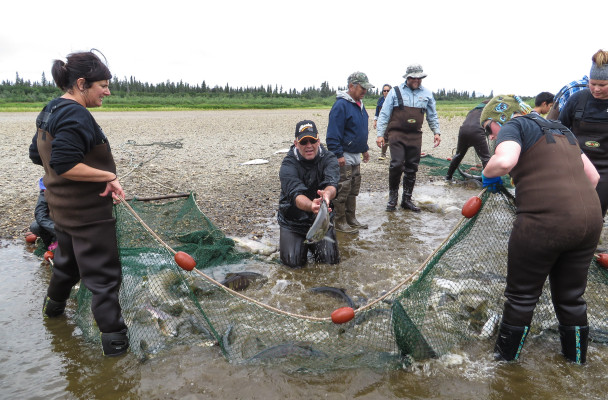
Before they go back to school later this month, teachers and administrators have to go camping.
Organized by Nome’s Northwest Campus and funded through a grant, Educator Cultural Camp is for teachers with Nome Public Schools and the Bering Strait School District. Tom and BeeJay Gray hosted this summer’s cultural orientation — which gives teachers university credit to apply to their certifications — during the last week of August at their fish camp on the Niukluk River.
The fifth annual Educator Cultural Camp brought 20 teachers and administrators together for five days of boating, berry picking, and fishing. Educators from Nome, Gambell, and White Mountain came to get firsthand experience in subsistence — and understand the lives of their students and people around the Bering Strait region.
“I was very naïve when I first got here about what camp was,” said Suzanne Bell. “When we say back home ‘you go to camp,’ it’s usually like a summer camp. I didn’t realize they were going camping in a way — hunting and things like that. I didn’t have the right idea in my head.”
Bell is originally from Tennessee and going into her second year as an elementary teacher in Gambell. While none of the educators at camp this summer were entirely new to Alaska, most aren’t Native, and they said they’re interested in making their curriculum culturally relevant to their students.
To give them an idea of how students spend their time at camp, Tom Gray took the group seining for silver salmon and taught them to cut their catch with ulus.
After days of hands-on activity, the educators spent their evenings discussing why culturally responsive education is important and how they can include it in their classrooms.
Barb Amarok is a retired teacher from Nome Public Schools and a current member of the school board. She led the evening classes and opened one night’s roundtable by discussing the dangers of distancing Native students from their cultures at school. The group talked about the trauma Native students faced in the late 19th and early 20th centuries when mandatory boarding schools separated students from their communities.
“They were kept from their home community for years at a time, so they didn’t learn their subsistence skills,” said Amarok. “They didn’t learn their language.”
“They were stripped of their language,” said another teacher.
“They were stripped of their culture,” said a third educator.
The teachers talked about avoiding cultural disconnect in today’s classrooms and integrating Native students’ experiences into academic lessons. Amarok emphasized that “life isn’t compartmentalized. Education shouldn’t be. There can be Bering Strait Region knowledge and skills incorporated in classroom lessons.”
One idea was incorporating Iñupiat values into JROTC instruction. Another was sewing kuspuks in art class. Yet another — from Nome teacher Liz Korenek-Johnson — was to “have kids documenting their culture, doing things like digital storytelling, [and] interviewing elders.”
“They can start drawing on those skills because we know they have them,” said Korenek-Johnson. “They are Alaska Natives and they are digital natives. There’s value in all of it.”
Bell said the value of Educator Cultural Camp lies in giving teachers more context about their students’ lives. One camp won’t make all lessons culturally relevant, but Bell said it helps teachers learn how to integrate culture more often in their own classrooms.
“I’m the outsider in a new culture, and I feel that it’s my responsibility to learn that culture,” Bell said. “I’m not assimilating them to me and my culture. I’m there to learn their culture and be a part as much as I can.”
Teachers will have the chance to apply their new cultural knowledge when the school year starts later this month — Aug. 19 for the Bering Strait School District and Aug. 24 for Nome Public Schools.
